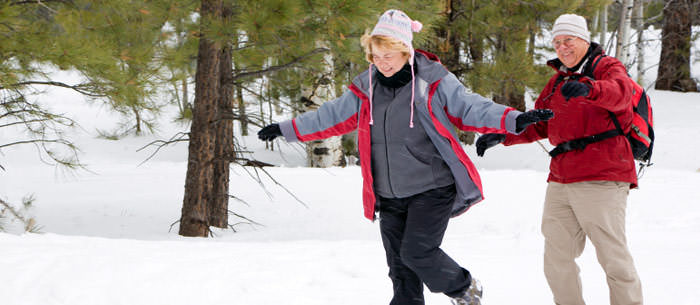7 Winter Safety Tips for Seniors
With the winter months hitting full-force in the Midwest, taking extra caution is important for all ages- especially for seniors. Here are Care.com's tips for ensuring safety for seniors this winter.
 With the winter weather hitting full-force in the Midwest, taking extra caution is important for all ages- especially for seniors. Here are Care.com's tips for ensuring safety for seniors this winter.
With the winter weather hitting full-force in the Midwest, taking extra caution is important for all ages- especially for seniors. Here are Care.com's tips for ensuring safety for seniors this winter.
1. Avoid Slipping on Ice
Icy, snowy roads and sidewalks make it easy to slip and fall. While younger people often recover relatively quickly from such injuries, older adults face complications, which Dr. Stanley Wang, a physician at Stanford Hospital in Palo Alto, Calif. says is the leading cause of death from injury in men and women over the age of 65.
In order to prevent these dangerous falls, it is important to wear shoes with good traction and non-skid soles, and stay inside until the roads are cleared. Replace a worn can tip to make walking easier. Take off shoes as soon as you return indoors because often snow and ice attach to the soles, and once melted, can lead to slippery conditions inside.
2. Dress for Warmth
According to the CDC, more than half of hypothermia-related deaths were of people over the age of 65. To prevent frostbite and hypothermia, don't let indoor temperatures get too low and dress in layers. If you are going outside, wear warm socks, a heavy coat, a warm hat, gloves and a scarf. In extreme cold, cover all exposed skin. Use a scarf to cover your mouth and protect your lungs.
Your body temperature should never dip below 95 degrees– if it does get medical assistance immediately.
3. Fight Wintertime Depression
Many seniors experience less contact with others during colder months. This can breed feelings of loneliness and isolation.
To help avoid these issues, family members can check in on seniors as often as possible; even a short, daily phone call can make a big difference. Seniors can also arrange a check-in system with neighbors and friends.
4. Check the Car
Driving during the winter can be hazardous for anyone. But it is especially dangerous for older people, who may not drive as often anymore or whose reflexes may not be as quick as they once were. Get your car serviced before wintertime hits — or ask a family member to bring it to a garage for you. Checking things like oil, tires, battery and wipers can make a big difference on winter roads. Also, make sure your AAA membership is up-to-date in case of emergencies.
5. Prepare for Power Outages
Winter storms can lead to power outages. Make sure you have easy access to flashlights and battery-powered radio in case the power goes out. Stockpile warm blankets. Longer power outages can spoil food in your refrigerator and freezer so keep a suppy of non-perishable foods that can be eaten cold on hand.
If the power goes out, wear several layers of clothing, including a hat. Move aroud a lot to raise your body temperature. Check this winter weather checklist from the CDC to make sure you have everything you may need.
6. Eat a Varied Diet
Vitamin D deficiency and other nutritional deficits can be a problem during the winter months. Make sure to consume foods that are fortified with Vitamin D, such as milk, grains and seafood like tuna and salmon.
7. Prevent Carbon Monoxide Posioning
Using a fireplace, gas heater or laterns can lead to carbon monoxide poisoning. Ensure your safety by checking the batteries on your carbon monoxide detector and buying an updated one if you need to.
During the winter months, it is important to ask for help. Whether it is asking for a ride to the grocery store, or hiring a professional to plow the sidewalks and driveways, don't be afraid to reach out for help. Wintertime certainly poses challenges for seniors, but with a bit of planning and awareness, you will stay healthy and experience the joys of springtime soon enough.
Photo: Care.com
